Around half the world’s EEZs are subject to some form of foreign fishing arrangements (FFA) providing access to the fish resources of developing countries for fleets from developed and middle income countries. Some types of FFA, particularly access agreements, can account 50% of public revenues in some African and small island countries. FFA are primarily established for export , but can also support local and regional markets. While FFA can bring substantial short to medium-term benefits to developing countries, the ways FFA are negotiated and the institutional arrangements under which they are managed, may be prejudicial to long-term resource sustainability. For some time, FFA have been associated with low transparency, inequitable benefit sharing, conflict with small-scale fisheries, and contributing to resource depletion. They are often further criticized because some FFA benefit from cost-reducing subsidies provided by the flag states.
The Scramble for Fish program sets out to explore this perception as a hypothesis. Its principle aim is to assist developing countries in identifying the means to secure equitable and sustainable returns from FFA, particularly ensuring that effective national management systems underpin FFA. Further, it will encourage flag states to adopt more responsible policies and practices with regard to the behaviour and activities of their fleets.
To achieve this aim the principle objectives of the work are:
-
To provide guidance on the effective and responsible governance and management of the resources under the FFA for both host country and flag state;
-
To directly support the key role of fisheries governance within Country Assistance Strategies (CAS) through adding value by mitigation of malpractice and empowering local communities to play a central role in assessment, monitoring and determining benefits from natural resources;
Provide guidance on how small scale fisheries and fishing communities can be established to provide impact on FFA whist also assuming responsibilities for sustainable management.

